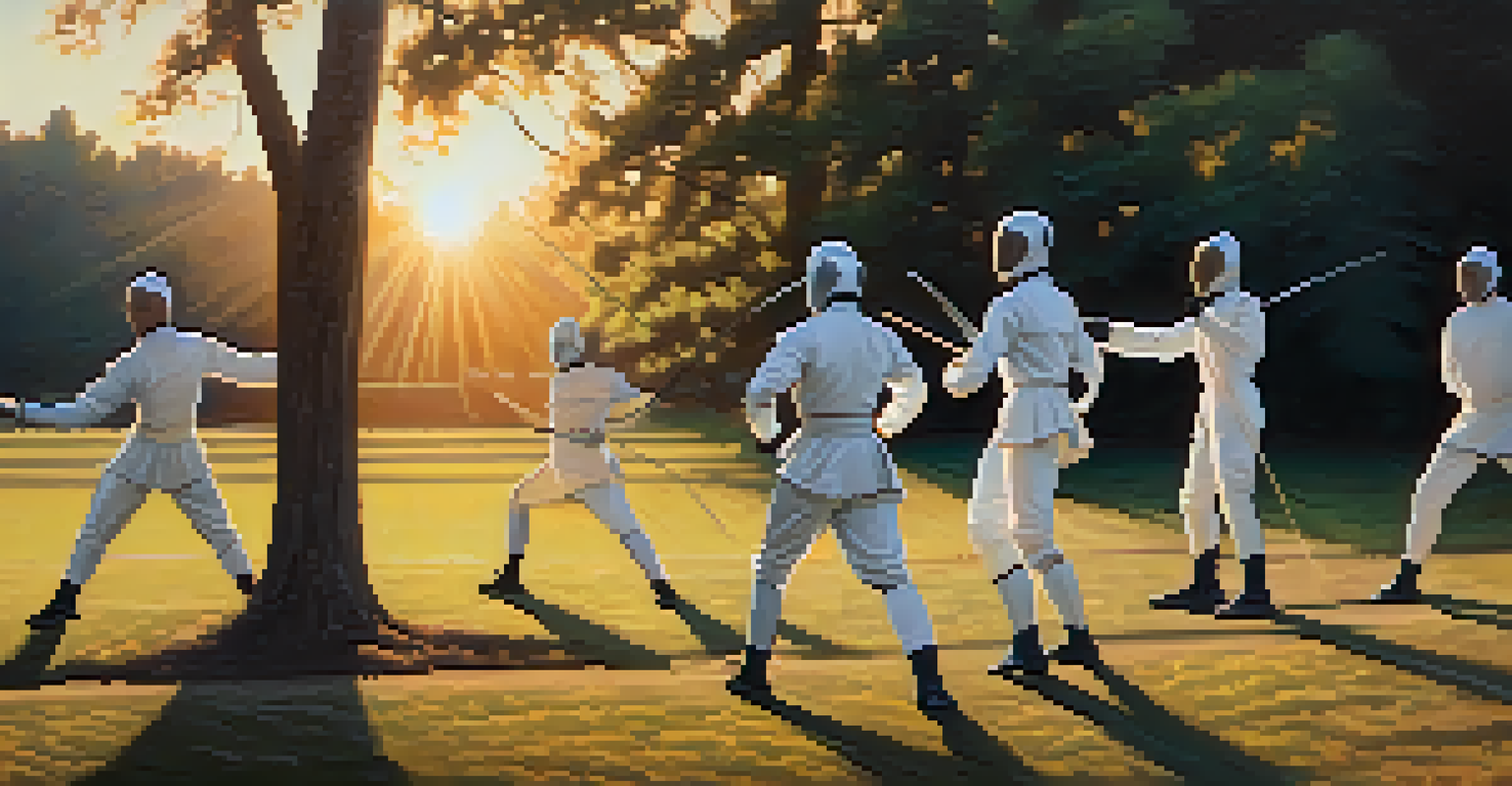Building Endurance for Fencing: Training Tips and Techniques

Understanding the Importance of Endurance in Fencing
Endurance is crucial in fencing, as matches require quick bursts of speed over an extended period. Unlike some sports, where short sprints dominate, fencing demands sustained energy levels to maintain performance throughout a bout. A fencer without adequate endurance may struggle to keep up, potentially leading to mistakes and losses.
Endurance is not just the ability to bear a hard thing, but to turn it into glory.
Think of fencing like a game of chess played at lightning speed. Each move requires not just skill but also the stamina to outlast your opponent. By building endurance, you can execute your strategies more effectively, making you a formidable presence on the strip.
Ultimately, improving endurance helps you stay sharp mentally as well. When fatigue sets in, decision-making can falter, and technique may suffer. Thus, endurance plays a vital role in both physical capability and tactical execution.
Incorporating Aerobic Exercises into Your Routine
Aerobic exercises are foundational for building endurance, as they improve cardiovascular health and overall stamina. Activities like running, cycling, or swimming are excellent choices that can easily fit into your training regimen. Aim for at least 30 minutes of moderate-intensity aerobic exercise several times a week to start seeing improvements.

Imagine your heart as a pump; the more you train it, the stronger it becomes. This increased efficiency means your body can deliver oxygen to your muscles more effectively, helping you maintain energy levels during long matches. You’ll find that you recover quicker between bouts, too.
Endurance is Key in Fencing
Sustained energy levels are crucial for maintaining performance during fencing matches, as fatigue can impact both physical ability and decision-making.
Incorporating interval training can further enhance your endurance. By alternating bursts of high-intensity activity with periods of lower intensity, you can simulate the stop-and-go nature of fencing, preparing your body for the demands of a real match.
Strength Training: Building Muscles for Endurance
Strength training is not just about bulking up; it plays a vital role in endurance as well. By developing muscle strength, you're equipping your body to perform efficiently during long matches. Exercises like squats, lunges, and deadlifts can enhance your lower body power, improving your ability to spring into action.
The mind is everything. What you think you become.
Consider your muscles as the engine of your body; a stronger engine runs more efficiently. Stronger muscles can produce force with less energy, which is crucial when you're trying to outmaneuver your opponent. You'll find that your movements become more explosive and your stamina increases.
Moreover, don’t neglect your core – a strong core stabilizes your movements and ensures better balance. Incorporate planks, bridges, and rotational exercises to enhance your core strength, which directly contributes to your endurance on the fencing strip.
The Role of Flexibility in Endurance Training
Flexibility might not seem directly related to endurance, but it enhances overall performance and reduces the risk of injury. Incorporating stretching routines into your training can improve your range of motion and help maintain efficiency in your movements. This means you can conserve energy while executing techniques more fluidly.
Think of flexibility like oil in a machine; it allows everything to work smoothly. When your muscles and joints are flexible, you can respond quicker and with less effort, which is crucial during fast-paced fencing bouts. Regular stretching can also aid in recovery after intense workouts.
Nutrition Fuels Endurance Training
A well-balanced diet rich in carbohydrates, proteins, and hydration is essential for providing the energy needed for rigorous fencing training.
Dynamic stretching before training and static stretching afterward can be beneficial. Try incorporating movements like leg swings or arm circles before practice, and hold stretches after sessions to improve your flexibility over time.
Nutrition: Fueling Your Body for Endurance
Nutrition plays a critical role in building endurance for fencing. Consuming a well-balanced diet rich in carbohydrates, proteins, and healthy fats provides the energy needed for rigorous training. Carbohydrates, in particular, serve as the primary fuel source for high-intensity activities like fencing.
Imagine your body as a high-performance vehicle; it requires the right type of fuel to run efficiently. Incorporate whole grains, fruits, and vegetables into your meals for sustained energy. Protein is also essential for muscle repair, so don’t forget to include lean meats, dairy, or plant-based protein sources in your diet.
Hydration is equally important. Dehydration can lead to fatigue and decreased performance, so make sure to drink water throughout the day, especially before and after training sessions. Consider electrolyte-rich drinks during intense workouts to keep your energy levels high.
Mental Endurance: Training Your Mind
Endurance isn't just physical; mental stamina is equally crucial in fencing. The ability to focus, stay calm under pressure, and think strategically can greatly influence your performance. Incorporating mindfulness practices, such as meditation or visualization, can help enhance your mental resilience.
Think of your mind as a muscle that needs training too. Just as you condition your body, practicing mental exercises can improve your focus and decision-making during matches. Regular mental training can help you stay composed, even when fatigue starts to set in.
Mental Toughness Enhances Performance
Developing mental endurance through mindfulness and goal-setting strategies can significantly improve focus and resilience during competitive bouts.
Additionally, setting specific goals can sharpen your mental endurance. Break down your training into manageable milestones, which helps keep you motivated and focused on your progress. Celebrate small wins to reinforce a positive mindset and build confidence.
Rest and Recovery: Key to Endurance Training
Rest and recovery are often overlooked but are essential components of any training program. Your body needs time to repair and rebuild after intense workouts, which is crucial for endurance development. Without proper rest, you risk burnout and injuries, which can derail your training progress.
Consider recovery as the downtime your body needs to recharge its batteries. This might include getting enough sleep each night, which is vital for muscle recovery and mental clarity. Aim for 7-9 hours of quality sleep to support your training efforts.

Incorporate active recovery days into your routine as well. Low-intensity activities, such as walking or yoga, can promote circulation and aid in recovery without putting additional strain on your body. This balance of training and recovery is key to building lasting endurance for fencing.